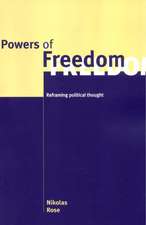Islamic Revivalism in Syria: The Rise and Fall of Ba'thist Secularism: Routledge Studies in Political Islam
Autor Line Khatiben Limba Engleză Paperback – 10 mar 2014
This book examines Syria’s current political reality as regards its Islamic movement, describing the country’s present day Islamic groups – particularly their social profile and ideology – and offering an explanation of their resurgence. The analysis focuses on:
- Who are today’s Syrian Islamic groups?
- Why and how are they re-emerging after 22 years of relative silence as an important socio-economic and political force?
- How is the Syrian state dealing with their re-emergence in light of Syria’s secularism and ideologically diverse society?
Preț: 311.48 lei
Preț vechi: 356.16 lei
-13% Nou
Puncte Express: 467
Preț estimativ în valută:
59.60€ • 62.40$ • 49.32£
59.60€ • 62.40$ • 49.32£
Carte tipărită la comandă
Livrare economică 07-21 aprilie
Preluare comenzi: 021 569.72.76
Specificații
ISBN-13: 9781138789340
ISBN-10: 1138789348
Pagini: 268
Ilustrații: 8 black & white tables, 1 black & white line drawings
Dimensiuni: 156 x 234 x 23 mm
Greutate: 0.41 kg
Ediția:1
Editura: Taylor & Francis
Colecția Routledge
Seria Routledge Studies in Political Islam
Locul publicării:Oxford, United Kingdom
ISBN-10: 1138789348
Pagini: 268
Ilustrații: 8 black & white tables, 1 black & white line drawings
Dimensiuni: 156 x 234 x 23 mm
Greutate: 0.41 kg
Ediția:1
Editura: Taylor & Francis
Colecția Routledge
Seria Routledge Studies in Political Islam
Locul publicării:Oxford, United Kingdom
Public țintă
Postgraduate and UndergraduateCuprins
1. Introduction to the Subject of Secularism and Islamic Revivalism in Syria Part 1: The Origins of the Conflict 2. The Rise of a Secular Party to Power 3. The Rise and Fall of Political Islam in Syria Part 2: Hafez al-Asad's Era and the Conflict with the Muslim Brotherhood: Muting of Ba'thist Secularism in Syria 4. Conflict with the Muslim Brotherhood 5. Resurgence of Neo-fundamentalism and Decline of Political Islam as a Model for Change (1982-2000) Part 3: Bashar al-Asad's Era: Fundamentalist and Islamist Revivalism 6. Bashar al-Asad Following in his Father’s Footsteps: the Promotion of Moderate Islam from Above in the Name of De-Radicalization 7. Islamization from Below: Islamic Revivalism as a Model for Social Change and the Erosion of Ba´thist Secularism 8. Re-emergence of Political Islam: Syria’s Islamist Groups 9. Islamic Activism and Secularism in Syria 10. Conclusion
Notă biografică
Line Khatib is a senior research fellow at the ICAMES (Inter-University Consortium of Arab and Middle Eastern Studies), McGill University, and a visiting scholar at the Dubai School of Government. Her research interests lie within the fields of Comparative Politics, Political Economy, Political Islam, and Secularism, with a particular focus on Islamic groups as both social and political movements.
Recenzii
'Line Khatib’s book is an excellent overview of the Syrian Ba’th regime’s relations with Islam and especially of Syria’s creeping Islamization under Bashar al-Asad’s first decade. She shows how the regime’s attempt to foster a moderate Islam to counter secularists and radical Islamists inadvertently undermined secularism, leading to the Islamization of the anti-regime opposition after the Syrian Uprising.'
Raymond Hinnebusch, University of St Andrews, UK.
'In this remarkably prescient book, Line Khatib examines the erosion of Ba’thist secularism in the decade prior to the current civil war. Under Bashar al-Asad, she argues, the regime had sought to stabilize its position by reaching an accommodation with Islamist groups—thereby creating the political space for their growth and proliferation. Her analysis accurately predicts both the fragility of the regime and the foundations for Islamic radicalization since 2011, and is unquestionably important reading for anyone interested in contemporary Syrian politics.'
Rex Brynen, McGill University, Canada.
'Dr. Line Khatib has written a fascinating book, predicting and making clear in various ways what is going on in Syria today. Her in-depth study fills a (huge) gap in our knowledge of why Islam went through such a strong revival and became a potential political power threatening the regime of Bashar al-Asad. She convincingly explains how the regime itself gave a lot of space to the Islamic movements to the detriment of secularism.'
Nikolaos van Dam, author of The Struggle for Power in Syria: Politics and Society in Syria and the Ba'th Party (Routledge).
Raymond Hinnebusch, University of St Andrews, UK.
'In this remarkably prescient book, Line Khatib examines the erosion of Ba’thist secularism in the decade prior to the current civil war. Under Bashar al-Asad, she argues, the regime had sought to stabilize its position by reaching an accommodation with Islamist groups—thereby creating the political space for their growth and proliferation. Her analysis accurately predicts both the fragility of the regime and the foundations for Islamic radicalization since 2011, and is unquestionably important reading for anyone interested in contemporary Syrian politics.'
Rex Brynen, McGill University, Canada.
'Dr. Line Khatib has written a fascinating book, predicting and making clear in various ways what is going on in Syria today. Her in-depth study fills a (huge) gap in our knowledge of why Islam went through such a strong revival and became a potential political power threatening the regime of Bashar al-Asad. She convincingly explains how the regime itself gave a lot of space to the Islamic movements to the detriment of secularism.'
Nikolaos van Dam, author of The Struggle for Power in Syria: Politics and Society in Syria and the Ba'th Party (Routledge).
Descriere
This book describes Syria’s present day Islamic groups – particularly their social profile and ideology – as well as offering an explanation of their resurgence. It also examines the government’s shift from promoting secularism to muting secularism and co-opting Islamic sectors.
























